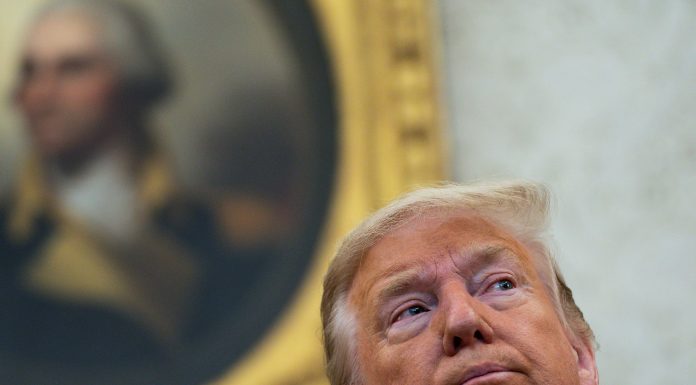(Associated Press) President Donald Trump is preparing to invoke emergency powers as the country struggles to contain the coronavirus outbreak, according to two people familiar with the planning who spoke on condition of anonymity.
It was still unclear Friday, however, precisely what mechanism Trump would use to free up additional federal resources for testing and treatment as well as help those struggling with the economic impact.
Trump is poised to speak at 3 p.m. at the White House. “Topic: CoronaVirus!” he tweeted.
The move comes as House Speaker Nancy Pelosi and the Trump administration are laboring to finish a coronavirus aid package Friday that would fast-track federal aid to anxious Americans and calm teetering financial markets amid the global crisis.
Central to the effort is free testing for the virus and guaranteed sick pay for workers who are taking time away from jobs, along with an infusion of dollars to handle unemployment benefits and boost food programs for children, families and seniors.
Pelosi and Treasury Secretary Steven Mnuchin both indicated a deal was within reach after days of around-the-clock negotiations, with expectations of a Friday announcement. The House could then swiftly vote. Republican leaders are reviewing the details.
GOP leaders in Congress want to be sure that Trump publicly supports the package before they sign off on it ahead of any vote, according to a top congressional aide unauthorized to discuss the private talks and speaking on condition of anonymity.
Earlier Friday, Mnuchin sounded an optimistic note. “I think we’re very close to getting this done,” he said in an appearance on CNBC.
On the COVID-19 illness, Mnuchin cautioned that “people should understand the numbers are going to go up before they go down.”
Providing sick pay for workers is a crucial element of federal efforts to stop the rapid spread of the infection. Officials warn that the nation’s healthcare system could quickly become overwhelmed with gravely sick patients, as suddenly happened in Italy, one of the countries hardest hit by the virus.
The ability to ensure paychecks will keep flowing — for people who stay home as a preventative measure or because they’re feeling ill or caring for others — can help assure Americans they will not fall into financial hardship.
“We’re in an emergency, and we’re trying to respond as fast as we can,” said House Appropriations Committee Chairwoman Nita Lowey, D-N.Y., as lawmakers filed in and out of Pelosi’s office on Friday.
Late Thursday, Pelosi said an agreement on an aid package was near. She said a deal was “subject to an exchange of paper and we hope to have an announcement tomorrow.” Pelosi and Mnuchin spoke again early Friday.
The potential deal between Congress and the White House would cap a tumultuous week in which Washington strained for a comprehensive response to an outbreak that is testing the nation’s political, financial and health care systems.
Trump has struggled to show he’s on top of the crisis, after giving conflicting descriptions of what the U.S. is doing to combat the virus. Classes, sports events, concerts and conferences have been canceled across the nation, and the financial markets have been cratering.
In one welcome announcement, the administration said Friday it is awarding $1.3 million to two companies trying to develop rapid COVID-19 tests that could detect within an hour whether a person is positive for the new coronavirus.
The House aid package builds on an emergency $8.3 billion measure approved last week and is aimed at providing additional health and financial resources to arrest the sudden spread of the pandemic and the kind of economic fallout unseen in a generation. Pelosi promised in a letter to colleagues that a third package was yet to come.
The new sick leave benefit would require businesses to provide up to 14 days of paid leave, with the federal government reimbursing them through tax credits. The bill facilitates unemployment benefits for those laid off during the crisis and boosts food and nutrition programs for working families, students and seniors. Work requirements for food stamps would be suspended, and states would be given additional Medicaid funds to cope with the crisis.
“We felt that putting together something that the American people can see cooperation on between the two parties in this difficult moment would be a confidence builder,” said Rep. Richard Neal, D-N.J., the chairman of the Ways and Means Committee.
Pelosi promised a third coronavirus package will follow soon, though the House is leaving Washington on Friday for a previously scheduled recess. That measure will include more aggressive steps to boost the U.S. economy, which economists fear has already slipped into recession.
But there’s little appetite within either party for Trump’s proposal to suspend collection of the 6.2% Social Security payroll tax, and Democratic economic stimulus ideas like more generous food stamp benefits aren’t favored by Republicans, while Democrats aren’t very friendly to GOP ideas like easing business regulations. States are already clamoring for fiscal relief from Washington as the virus threatens their budgets.
Mnuchin, however, said on Friday that the president remains committed to pursuing the payroll tax cut. “It is a giant stimulus.”
Disruptions from the virus spread throughout the Washington metropolitan area, as the Capitol, White House and Supreme Court all declared themselves off limits to the public for now, symbols of a nation hunkering down. And schools in the District of Columbia announced they would close, starting Monday, until April 1.
The storied Smithsonian said it was canceling all public events and will temporarily close its network of museums and the National Zoo, starting Saturday. And Trump proposed postponing this summer’s Olympics in Japan for a year, too.
Trump said he will halt his signature campaign rallies, telling reporters he needs a “little separation until such time as this goes away.” Democratic presidential rivals Joe Biden and rival Sen. Bernie Sanders said they would no longer hold large political gatherings and their staffs would work from home as the race for the presidency moved online.



